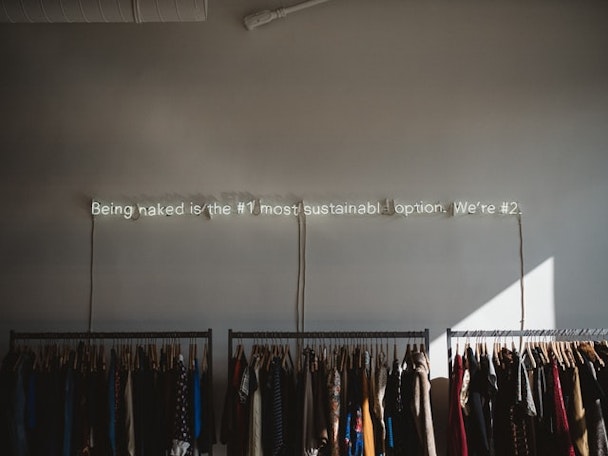Why sustainability needs to be on every retailer’s agenda now
‘Sustainability’ is a term that’s thrown around so loosely these days it’s in danger of becoming meaningless. Retailers have promised to decarbonize over the next few decades, but their actual commitments in 2021 are vague and the industry’s carbon footprint remains staggeringly high. For example, Amazon’s prioritization of faster shipping for customers in 2020 meant they rejected greener shipping options for fear of alienating customers.

The UN says we can limit global temperature rise to two degrees if we act now
No wonder consumers are sceptical about retailers honoring their promises of a sustainable future. But imagine if they switched their entire deliver fleet to electric vehicles!
Aside from a few superstars like The Body Shop and Patagonia, many retailers are procrastinating instead of actioning real sustainable changes today. This is understandable because the issues are so huge it’s difficult to know where to start.
But the reality is retailers can’t afford to put it off any longer, for the climate’s sake and their own survival. As Margaret Atwood said in her role as ‘Under Her Eye’ Women & Climate Change Summit ambassador: “This isn’t climate change; it’s everything change.”
As the pandemic subsides and the economy restarts, sustainability could be the ace up a retailer’s sleeve that accelerates business growth. There are three big benefits to shifting to sustainability now: better sales, better connection with customers, and better differentiation.
1. Sustainability sells
It’s a fallacy that profits will fall in a sustainable world. Resilient retailers are turning sustainability into success for their business. They have a common trait: they’ve redesigned their customer experiences around sustainability.
For proud B-Corps like Innocent and Chipotle, this is not a tick box exercise at the expense of profitability. In fact, the growth of consumer-packaged-goods marketed as sustainable outperforms those that are unsustainable, growing 5.6 times faster.
Sustainable retailers are also rewarded with increased customer engagement and loyalty. Ikea’s introduction of circular services such as Buy Back and upcycling foster circular, profitable relationships with participating customers.
Sometimes genuinely acting sustainably means stepping back from selling – at Rapp we created Disassembly Instructions to help customers dismantle their Ikea furniture for moving, storing or re-selling. It gave customers an easy, affordable way to act sustainably, creating value for them and improving satisfaction and loyalty.
The one thing retailers shouldn’t do is give up on sustainable transformation if the numbers on their balance sheet dip. This is no place for short-termism. In the same way that environmentalism is about long-term solutions, retailers who shift now will benefit from long-term sales growth.
2. Sustainability drives connection with consumers
Going from zero to green is impossible. So it helps retailers to reframe ‘saving the planet’ as an opportunity to develop deeper emotional connections with consumers while enabling them to live greener lives.
Flipping consumption on its head is a great source of creative inspiration. Fashion brands like Reformation tap into the desire to boast about re-wearing old outfits.
Sustainability allows a variety of authentic stories to be told, creating relationships that go beyond product transactions. By doing this retailers can stop limiting their reach to audiences who are already sustainably active and connect to more people.
It feels to me like 80% of sustainability communications go to 20% of the potential audience, missing the opportunity to connect with everyone. When every single email costs 1g of carbon we should really be making them count. Retailers can start engaging diverse audiences on the topic of sustainability by considering customer needs that aren’t being met. Imagine how H&M’s Conscious clothing range could connect with customers who are plus-size or disabled by presenting relevant solutions.
3. Sustainability drives distinction
Brands are getting smarter at standing out from the crowd. Marketers recognize that purpose is a hygiene factor, and many consumers actively shop elsewhere if they disagree with a brand’s values. Sainsbury’s have just launched a promise to ‘help everyone eat better’, highlighting that not only can delicious food be healthy and affordable, but sustainable too. This delivers both the need for healthier lives and the expectation that brands should be greener, setting Sainsbury’s apart from the discount supermarkets.
Start-ups and challengers are great at innovating to drive brand distinction. Take Seedlip, which designed its regenerative packaging with nature’s best interests foremost – and, helpfully, it also justifies the premium price tag that Diageo charges for Seedlip drinks.
But sustainability isn’t always a territory to compete in, it can be a space for partnership. The collaboration between Burberry and luxury accessory brand Elvis & Kresse was an opportunity for knowledge sharing between the two businesses. Burberry shared its platform and 120 tonnes of leather offcuts, which are annually made into luxury patchwork products thanks to Elvis & Kresse’s expertise.
Start the new era as we mean to go on
It’s not down to a few powerful companies like Unilever to single-handedly own sustainability and fix the climate crisis. All retailers are going to have to innovate their way out of this crisis. The retail industry has already reinvented itself for the digital age, so let’s use those powers of innovation to shape a better planet.
The UN says we can limit global temperature rise to two degrees if we act now, and retailers can do so by:
-
Creating solutions for customers to make small sustainable actions easily and cheaply
-
Talking to wider audiences about sustainability
-
Partnering with another brand to solve a problem
These simple steps not only offer potential future-proofing but enhanced customer loyalty, brand distinction and brand value: why not make a start now?
Charlotte Tullett is associate strategy director at Rapp UK.
Content by The Drum Network member:

RAPP
RAPP is a global, data-driven creative community that builds direct, meaningful and high-value relationships between brands and people. At RAPP, with our unrivalled...
Find out more
